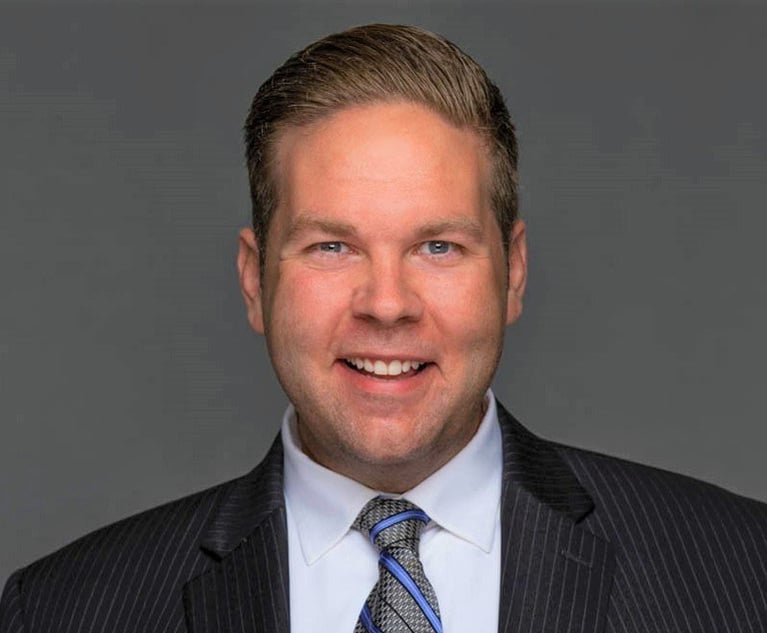3rd Circ. Overturns Conviction for Mentally Ill Defendant Denied Trial After Plea Was Rejected
The U.S. Court of Appeals for the Third Circuit held that when Anthony Velazquez's guilty but mentally ill plea was incorrectly recorded as a standard guilty plea, the defendant's right to trial was violated.
September 03, 2019 at 02:35 PM
3 minute read

A defendant who pleaded guilty to multiple crimes allegedly committed due to mental illness but was denied trial when the plea was not accepted has had his conviction overturned.
The U.S. Court of Appeals for the Third Circuit held that when Anthony Velazquez's guilty but mentally ill (GBMI) plea was incorrectly recorded as a standard guilty plea, the defendant's right to trial was violated. The three-judge panel agreed with Velazquez's claim that his lawyer was ineffective.
According to Judge Joseph Greenaway's opinion, the GBMI plea requires a defendant to waive the right to a jury trial in exchange for the promise of mental health treatment for the duration of the sentence. If a judge rejects the plea, the right to a jury trial is returned to the defendant.
But in Velazquez's case, the judge rejected the mental illness aspect of the guilty plea without reviewing the records and Velazquez was sent to prison after being convicted on burglary, assault and witness intimidation charges.
On appeal, Velazquez claimed his counsel was ineffective for failing to object to the defective plea process, Greenaway said.
"There is ample basis in the record to conclude that trial counsel was ignorant of the GBMI-plea procedures prescribed by Pennsylvania law," Greenaway said. "He concurred in the trial judge's suggestion that he would procure the necessary records and facilitate the requisite hearing, but failed to assure that this procedure was followed and failed to verify that the plea documents reflected the plea his client sought to enter. This falls below the performance expected of the counsel guaranteed by the Sixth Amendment."
Prosecutors argued that Velazquez had to make a showing of whether another plea would have been available, accepted by both the petitioner and the court, and that the other plea offered "less severe" terms than the "judgment and sentence," Greenaway said.
However, Greenaway added, Velazquez did not need to be bound by that standard to show prejudice.
"Velazquez does not need to demonstrate that his GBMI plea is likely to be accepted or that a favorable finding of severe mental illness will result. Nor does he need to demonstrate that the outcome of the two findings will be a lesser sentence," Greenaway said. "We will find prejudice if there is a reasonable probability that, but for trial counsel's failure to object to the defective plea procedure, Velazquez would have taken advantage of the process of which he was deprived. The record is unequivocal that this is the case. The only hindrance to Velazquez's efforts to enter a GBMI plea was the constitutionally defective assistance he received from trial counsel."
Travis Anderson of the Lancaster County District Attorney's Office declined to comment.
Rosemary Auge, Velazquez's public defender, also did not respond to a request for comment.
This content has been archived. It is available through our partners, LexisNexis® and Bloomberg Law.
To view this content, please continue to their sites.
Not a Lexis Subscriber?
Subscribe Now
Not a Bloomberg Law Subscriber?
Subscribe Now
NOT FOR REPRINT
© 2025 ALM Global, LLC, All Rights Reserved. Request academic re-use from www.copyright.com. All other uses, submit a request to [email protected]. For more information visit Asset & Logo Licensing.
You Might Like
View All
Samuel M. Lehrer, Retired Philadelphia Court of Common Pleas Judge, Dies
1 minute read

Longtime Reed Smith Health Care Partner Opts for Solo Practice Over Retirement
3 minute read
Trending Stories
- 1The Quiet Revolution: Private Equity’s Push Into Law Firms
- 2Restoring Trust in the Courts Starts in New York
- 3'Pull Back the Curtain': Ex-NFL Players Seek Discovery in Lawsuit Over League's Disability Plan
- 4Tensions Run High at Final Hearing Before Manhattan Congestion Pricing Takes Effect
- 5Improper Removal to Fed. Court Leads to $100K Bill for Blue Cross Blue Shield
Who Got The Work
Michael G. Bongiorno, Andrew Scott Dulberg and Elizabeth E. Driscoll from Wilmer Cutler Pickering Hale and Dorr have stepped in to represent Symbotic Inc., an A.I.-enabled technology platform that focuses on increasing supply chain efficiency, and other defendants in a pending shareholder derivative lawsuit. The case, filed Oct. 2 in Massachusetts District Court by the Brown Law Firm on behalf of Stephen Austen, accuses certain officers and directors of misleading investors in regard to Symbotic's potential for margin growth by failing to disclose that the company was not equipped to timely deploy its systems or manage expenses through project delays. The case, assigned to U.S. District Judge Nathaniel M. Gorton, is 1:24-cv-12522, Austen v. Cohen et al.
Who Got The Work
Edmund Polubinski and Marie Killmond of Davis Polk & Wardwell have entered appearances for data platform software development company MongoDB and other defendants in a pending shareholder derivative lawsuit. The action, filed Oct. 7 in New York Southern District Court by the Brown Law Firm, accuses the company's directors and/or officers of falsely expressing confidence in the company’s restructuring of its sales incentive plan and downplaying the severity of decreases in its upfront commitments. The case is 1:24-cv-07594, Roy v. Ittycheria et al.
Who Got The Work
Amy O. Bruchs and Kurt F. Ellison of Michael Best & Friedrich have entered appearances for Epic Systems Corp. in a pending employment discrimination lawsuit. The suit was filed Sept. 7 in Wisconsin Western District Court by Levine Eisberner LLC and Siri & Glimstad on behalf of a project manager who claims that he was wrongfully terminated after applying for a religious exemption to the defendant's COVID-19 vaccine mandate. The case, assigned to U.S. Magistrate Judge Anita Marie Boor, is 3:24-cv-00630, Secker, Nathan v. Epic Systems Corporation.
Who Got The Work
David X. Sullivan, Thomas J. Finn and Gregory A. Hall from McCarter & English have entered appearances for Sunrun Installation Services in a pending civil rights lawsuit. The complaint was filed Sept. 4 in Connecticut District Court by attorney Robert M. Berke on behalf of former employee George Edward Steins, who was arrested and charged with employing an unregistered home improvement salesperson. The complaint alleges that had Sunrun informed the Connecticut Department of Consumer Protection that the plaintiff's employment had ended in 2017 and that he no longer held Sunrun's home improvement contractor license, he would not have been hit with charges, which were dismissed in May 2024. The case, assigned to U.S. District Judge Jeffrey A. Meyer, is 3:24-cv-01423, Steins v. Sunrun, Inc. et al.
Who Got The Work
Greenberg Traurig shareholder Joshua L. Raskin has entered an appearance for boohoo.com UK Ltd. in a pending patent infringement lawsuit. The suit, filed Sept. 3 in Texas Eastern District Court by Rozier Hardt McDonough on behalf of Alto Dynamics, asserts five patents related to an online shopping platform. The case, assigned to U.S. District Judge Rodney Gilstrap, is 2:24-cv-00719, Alto Dynamics, LLC v. boohoo.com UK Limited.
Featured Firms
Law Offices of Gary Martin Hays & Associates, P.C.
(470) 294-1674
Law Offices of Mark E. Salomone
(857) 444-6468
Smith & Hassler
(713) 739-1250





